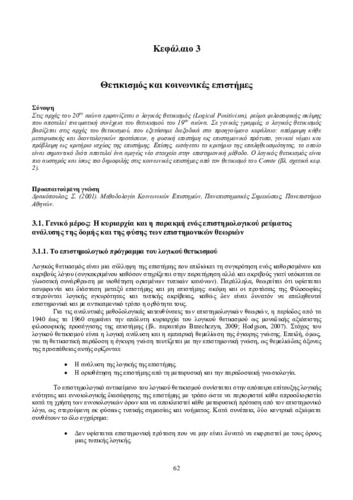| Title Details: | |
|
Positivism and social sciences |
|
| Authors: |
Drakopoulos, Stavros |
| Reviewer: |
Zoumpoulakis, Michail |
| Subject: | HUMANITIES AND ARTS > PHILOSOPHY > PHILOSOPHICAL DISCIPLINES (EXCEPT ETHICS) > PHILOSOPHY OF SCIENCE LAW AND SOCIAL SCIENCES > ECONOMIC SCIENCES > HISTORY OF ECONOMIC THOUGHT, METHODOLOGY, AND HETERODOX APPROACHES HUMANITIES AND ARTS > HISTORY > SPECIALIZED HISTORIES > HISTORY OF SCIENCES AND TECHNOLOGY |
| Keywords: |
Methodology Of Economics
History Of Economic Thought Philosophy Of Social Sciences |
| Description: | |
| Abstract: |
Οι μεθοδολογικές αρχές του Θετικισμού. Η ιεράρχηση των επιστημών και o ρόλος της Κοινωνιολογίας κατά τον A. Comte. Θετικισμός και μεθοδολογία φυσικών επιστημών. Ο κύκλος της Βιέννης και οι μεθοδολογικές αρχές του Λογικού Θετικισμού. Η Επίδραση του Θετικισμού στις Κοινωνικές Επιστήμες. Θετικισμός και Ψυχολογία: Ψυχοφυσική, Συμπεριφορισμός. Θετικισμός και Κοινωνιολογία: Λογικό-πειραματική μέθοδος. Εισαγωγή ποσοτικών μεθόδων στην Κοινωνιολογία. Θετικισμός και Πολιτική Επιστήμη: Πολιτική Φυσική, Μαθηματική Πολιτική και Πολιμετρία. Πολιτική επιστήμη και Συμπεριφορισμός.
|
| Table of Contents: |
3.1. General part: the dominance and the decline of a scientific approach regarding the structure and the nature of the scientific theories analysis.
3.1.1. The epistemological program of logical positivism 3.1.2. The contribution of logical positivism in the philosophy of science 3.1.3. The configuration of a theory analysis framework 3.1.4. The criticism of logical positivism 3.1.5. Conclusions 3.2. Special part: the effect of positivism in social sciences 3.2.1. An introduction 3.2.2. Psychology 3.2.3. Sociology 3.2.4. Political Science 3.2.4.1. An introduction 3.2.4.2. The subject of the political science 3.2.4.3. The configuration of the modern political science 3.2.4.4. Subject area and cognitive interests 3.2.4.5. Definitions and fields of political science 3.2.4.6. The modern empirical political science: methods and applications 3.2.4.7. Conclusions 3.2.5. The biology as social science: the development of sociobiology 3.2.5.1. The requirements of sociobiology development 3.2.5.2. The positivist and reductionist logic: moral and normative dilemmas 3.2.6. The social psychology 3.2.6.1. The subject of social psychology 3.2.6.2. Subject area and cognitive interests of social psychology 3.2.6.3. Methods and research problems 3.2.7. Social sciences in non-positivist bases: the social anthropology 3.2.7.1. The development of social anthropology 3.2.7.2. Research method in non-positivist perspective: the participatory model 3.2.7.3. Main fields of anthropology research 3.3 Conclusions References Evaluation tests Questions Answers Matching exercise Answers |
| Linguistic Editors: |
Katseli, Ioanna |
| Technical Editors: |
Tsaknis, Antonios |
| Type: |
Chapter |
| Creation Date: | 2015 |
| Item Details: | |
| License: |
http://creativecommons.org/licenses/by-nc-sa/3.0/gr |
| Handle | http://hdl.handle.net/11419/1879 |
| Bibliographic Reference: | Drakopoulos, S. (2015). Positivism and social sciences [Chapter]. In Drakopoulos, S., Gkotsis, G., & Grimani, A. 2015. METHODOLOGY OF SOCIAL AND ECONOMIC SCIENCES [Undergraduate textbook]. Kallipos, Open Academic Editions. https://hdl.handle.net/11419/1879 |
| Language: |
Greek |
| Consists of: |
1. Matching exercise |
| Is Part of: |
METHODOLOGY OF SOCIAL AND ECONOMIC SCIENCES |
| Number of pages |
30 |
| Publication Origin: |
Kallipos, Open Academic Editions |


